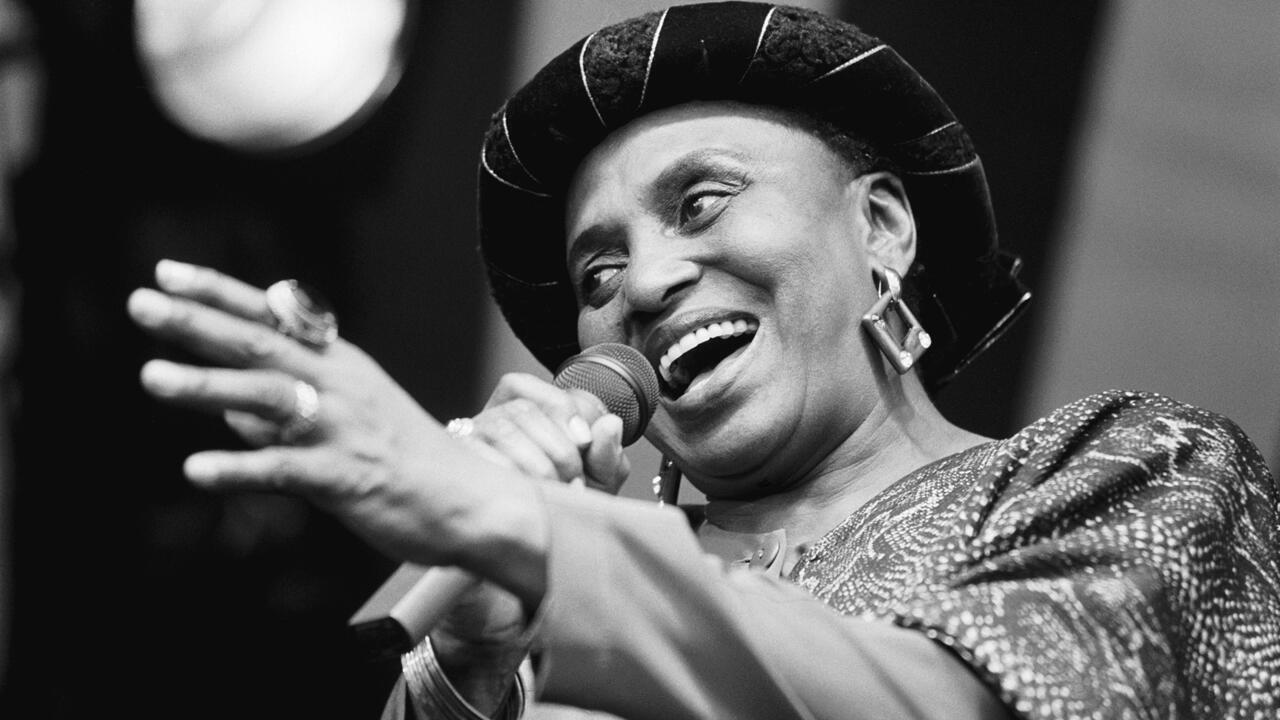The Epic of Black Music
Long live "Mama Afrika"!
Singer Miriam Makeba, on August 4, 1990, in concert in Delft, the Netherlands.
© Redferns - Frans Schellekens
By: Joe Farmer Follow
4 mins
Born March 4, 1932 in Johannesburg, South Africa, singer Miriam Makeba was and will remain an indomitable activist.
"Mama Afrika" was the symbol of universal freedom.
His fights, his exile, his declarations, his insubordination command respect.
She was repeatedly invited to speak on RFI.
His words, taken from our sound archives, nourish our understanding of an epic as painful as it is majestic.
Advertising
It was in a gospel choir popular in the 1950s in southern Africa, the Manhattan Brothers, that the young Zenzile Makeba began to get noticed.
Her melodic and tonic voice caused a sensation and her notoriety raised her to the rank of great South African performers.
She was then only 24 years old.
His passion for singing arouses the curiosity of his contemporaries and makes him meet different personalities who, indirectly, will shake up his future as a young star of the vocal art.
While recording her first records in New York at the turn of the 1960s, Miriam Makeba did not imagine that this trip across the Atlantic would turn into a 31-year exile.
Already very critical of the apartheid regime she suffered as a child in South Africa,
it will find in the United States support and reinforcement from the African-American community which will feed its activism and its rebellion.
One of the first to support his civic engagement will be the singer Harry Belafonte.
We are May 2, 1960 at Carnegie Hall.
Miriam Makeba seduces the New York public by singing in her mother tongue and thus imposes her identity and her culture.
However, his open-mindedness does not prevent him from addressing the world in several languages.
Miriam Makeba is gaining confidence.
The civil rights movement in the United States espouses its own beliefs against racism.
She even dared to appear at the United Nations platform on July 16, 1963, to castigate the South African segregationist regime.
Miriam Makeba will never stop denouncing abuses wherever they are on this planet, but it is true that the political situation in her country worried her and pushed her to say aloud what everyone was thinking quietly.
Miriam Makeba will have fought all her life to make equality between all human beings a reality.
She will have been supported by many rebellious speakers, she will have sung her heroes, Lumumba or Malcolm X, she will have espoused the fight of her brothers and sisters from the African diaspora in the world, which will have earned her some setbacks with the authorities, in particular in the United States, where his positions in favor of the Black Panthers with Stokely Carmichael will force him to leave the country for Guinea.
Miriam Makeba in Glasgow.
© Ross Gilmore/Redferns/Getty images
Miriam Makeba had only one objective: to unite the living forces of the African people across the globe.
On June 11, 1988, she was at Wembley Stadium in London to celebrate the 70th birthday of Nelson Mandela, still a prisoner in South African jails, after 25 years in detention.
She shares the poster for a giant concert in the presence of many distinguished artists including Sting, Al Green, Joe Cocker, Tracy Chapman, Aswad, Whitney Houston, Stevie Wonder.
She then sings
Soweto Blues,
accompanied by her former husband, trumpeter Hugh Masekela.
Finally, on February 11, 1990, Nelson Mandela was released.
He is 72 years old, but retains this strength of character which enabled him to resist.
Miriam Makeba rejoices but is not fooled.
She knows that there is still a lot to do.
As a wind of hope blows over South Africa, Miriam Makeba feels her wings grow and invites trumpeter Dizzy Gillespie and pianist Nina Simone to join her in the studio.
We must not let our guard down.
She will therefore continue tirelessly to be indignant.
On March 4, 2022, Miriam Makeba would have turned 90.
She is now an eternal voice, respected around the world, which has advanced tolerance and harmony.
This artist, full of life and convictions, has contributed to changing our vision of the world, our state of mind and our sometimes unfounded certainties.
She opened her heart and sparked our examination of conscience.
She was an example.
Every time we listen to his works, we will instantly recall his teachings.
Miriam Makeba in Barcelona (Spain), January 17, 2008. © Jordi Vidal/Redferns/Getty images
Newsletter
Receive all the international news directly in your mailbox
I subscribe
Follow all the international news by downloading the RFI application
google-play-badge_FR
Culture
Musics
On the same subject
In person(s)
Miriam Makeba, the "Mama Africa" who switched from one language to another
The Epic of Black Music
Tony Allen salutes Hugh Masekela
tropical colors
Tubes & Cults tribute to Miriam Makeba, and The biggest nightclub in Africa

